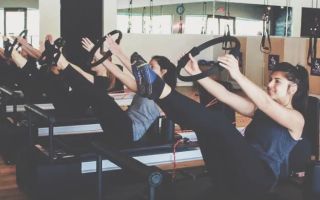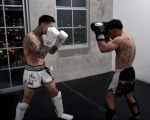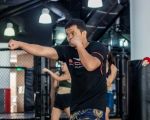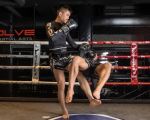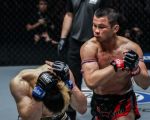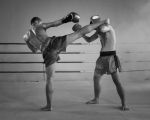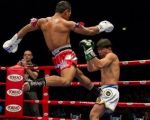- 1. Understanding the Muay Thai Clinch
- 2. Key Elements of an Effective Muay Thai Clinch
- 3. Common Muay Thai Clinch Techniques
- 4. How to Improve Your Clinch Control
- 5. Applying the Clinch in Competition
1. Understanding the Muay Thai Clinch
The Muay Thai clinch is one of the most dominant positions in this striking martial art, allowing you to control your opponent while delivering powerful knees, elbows, and even setting up sweeps or throws. Unlike other forms of combat where striking is more focused on punches and kicks, the Muay Thai clinch emphasizes the use of control, balance, and close-range striking. In this article, we’ll dive deep into the importance of the clinch, how it works, and how you can use it effectively to improve your Muay Thai game.
2. Key Elements of an Effective Muay Thai Clinch
To execute the Muay Thai clinch effectively, it’s essential to understand the fundamental elements of the position. The key factors include:
- Head Control: Keeping your opponent's head low is crucial to maintaining control in the clinch. This weakens their posture and limits their ability to strike back or defend against knee strikes.
- Strong Grip: A solid grip around the opponent’s neck or body allows you to manipulate their movements. The "double collar tie" is one of the most effective grips for maintaining control.
- Positioning: Positioning your body correctly within the clinch is essential. This means using your hips and body to create angles for knee strikes, as well as ensuring you are not off-balance yourself.
- Control of the Hips: Your ability to control your opponent’s hips plays a pivotal role in limiting their mobility and setting up throws or sweeps.
Mastering these elements will help you dominate your opponent when entering the clinch position and give you the tools to set up devastating attacks.
3. Common Muay Thai Clinch Techniques
There are several techniques that are commonly used within the Muay Thai clinch to maintain control and create openings for strikes. Some of the most essential techniques include:
- Knee Strikes: Knee strikes are a primary tool in the clinch, allowing you to land powerful blows to your opponent’s torso, head, or legs.
- Elbow Strikes: Elbows are used to cause damage in close-range, often cutting the opponent or forcing them to break from the clinch.
- Push-and-Pull: This technique involves pulling the opponent’s head down while pushing their body back, creating openings for knee strikes or destabilizing their posture.
- Sweeps and Throws: Using leverage and control, you can sweep your opponent’s legs or execute a throw to off-balance them, gaining an advantage in the clinch.
By incorporating these techniques into your training, you’ll become more versatile in the clinch and be able to execute devastating attacks from this position.
4. How to Improve Your Clinch Control
Improving your clinch control requires a combination of technique, timing, and conditioning. To better control your opponent, you need to practice specific drills that enhance your ability to maintain a strong grip and manipulate their body. Focus on the following:
- Strengthening Your Grip: The stronger your grip around the neck or body, the harder it will be for your opponent to break free. Conditioning exercises that target hand and forearm strength can help.
- Improving Your Balance: Balance is essential in the clinch, as it allows you to execute techniques without being easily thrown off. Practicing clinch positions while maintaining your own stability will help you gain an advantage.
- Timed Drills: Work with a partner to practice timing your entries into the clinch, setting up knee strikes, and transitioning between various clinch techniques.
With consistent practice, you can dramatically improve your clinch control, making you a more dominant fighter in close-range exchanges.
5. Applying the Clinch in Competition
In Muay Thai competitions, the clinch is a highly effective weapon when used at the right time. Whether you’re looking to control your opponent’s movement, wear them down with knee strikes, or set up a sweep or throw, the clinch is essential for gaining an edge in the fight. The key is to transition into the clinch smoothly, often following up with a combination of strikes to set up the clinch or catch your opponent off guard. Understanding when to engage and when to disengage is crucial in using the clinch effectively during competition.
Top Muay Thai fighters like Saenchai and Buakaw have mastered the clinch and use it to maintain dominance in the ring. By studying their techniques and applying them in your own training, you can become more proficient in clinch control and overall Muay Thai performance.






